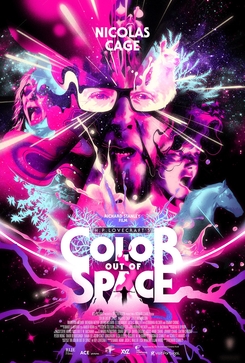
Cosmic horror is everywhere these days. Since HP Lovecraft first kicked off the subgenre in the early half of the 20th century, it’s spread from pulp magazines to all corners of horror literature, to table-top roleplaying games and video games. And while cosmic horror has been in the movies and on TV sporadically since the 1960s, in the past couple of years we’ve seen a glut of it on those mediums: Annihilation, Stranger Things, The Color Out of Space, Underwater, Lovecraft Country (which I’ll be watching soon now that I have HBO Max), The Endless, and most recently, The Chilling Adventures of Sabrina‘s fourth season (though not very well).
And there are more on the way. Just today, I heard about a new film called Sacrifice coming out next month that has Lovecraftian themes (click here to check out the trailer). Sometime this year, the long-awaited anime adaptation of Uzumaki by Junji Ito is supposed to air. Richard Stanley, the director of Color Out of Space, hopes to do a trilogy of films based off Lovecraft’s work.
And there’s a lot more that I probably don’t know about. Plus new games, novels and short stories, comics, manga and anime, poems and art! Cosmic horror is kinda going mainstream right now. Or as mainstream as horror can get.

The question is, why now? Why is this particular subgenre only now just getting mainstream acceptance? Why the sudden enthusiasm?
I think there are a few reasons. One is time and a devoted fanbase. Cosmic horror, as I said, originally came from pulp magazines with very small circulation. However, the fans who enjoyed the stories of Lovecraft and those who played in his world–what would later be known as the Cthulhu Mythos–preserved and kept the stories going even after the deaths of the magazines and of Lovecraft. Through hard work and advocacy, more fans found cosmic horror and found themselves drawn to the stories. Then as now, fans would then tell other fans, or create their own work based on these stories, which has a looping effect of creating more fans through exposure. So, it may have taken time, but cosmic horror has been able to spread with patience and the love of many who follow it.
Almost sounds like cosmic horror is an eldritch deity in and of itself, doesn’t it? I find that hilariously appropriate.
Another factor at play, I believe, is that modern audiences are more receptive to that kind of horror than they have been in the past. Like I said, it’s taken time for cosmic horror to penetrate the public consciousness, and so for many people, cosmic horror may be a nice change of pace from the usual horror fare. We’ve seen plenty of haunted house stories, slashers, and sequels and ripoffs of possession or ghost stories. Those elements are not normally part of cosmic horror. In fact, it could be a breath of fresh air for audiences.
And finally, while cosmic horror normally deals with ancient, otherworldly gods and terrible secrets, it’s a great place to talk about modern issues. Granted, horror has always been a place to explore our everyday fears and anxieties, but cosmic horror, through the perspectives and interactions of its human characters against these terrors, can do it in a unique way. Lovecraft Country uses cosmic horror to explore racism, which both was part of the genre’s start and which is a current problem today.

And I wrote a novella, What Errour Awoke, that combined elements of cosmic horror with the current pandemic to explore the fear with the latter. And yes, I still hope to get that published.
So, with all these factors, can we expect more cosmic horror in the near future? I think so. Maybe not in huge numbers from the movie industry, as cosmic horror tends to have a spotty track record there.* But certainly in other mediums. Horror-themed TV has been booming, so we’ll likely see plenty of shows exploring those themes in the future. Comics and manga have always loved cosmic horror. And, of course, we’ll likely see many, many new books or short stories in that vein.**
So long as they’re made with lots of love, both for the subgenre and for the projects themselves, rather than for the money, I look forward to it.
Are you a fan of cosmic horror? Are you enjoying the wave of new works in the subgenre? Let’s discuss in the comments below.
*While they were well-received by critics and moviegoers, Annihilation and Underwater underperformed at the box office, and Color Out of Space only had a limited theater release.
**Hopefully, I’ll be able to add to this. I’ve a few cosmic horror ideas waiting to be written. I’d love to share them with you all someday.









Cosmic horror itself is an eldritch deity, yup. I am reading Stage’s Wonderland right now. It’s cosmic horror mixed with a little folk horror, great stuff! I’m looking forward to What Errour Awoke.:-)
Thanks, Priscilla. And what’s Stage’s Wonderland about?
A family in New England becomes isolated in a forested winter wonderland gone freaky-scary-bonkers. There’s a cosmic presence in the landscape, and the folk part of the horror is similar to British Isles’ folk horror. (I’m trying to be vague about that so I won’t give out any spoilers.) The story is told through the eyes of the mom as she’s trying to hold the family of four together in the midst of all the horror befalling them.
It’s slow burn, like a Victorian Gothic horror transplanted to contemporary New England.
I may have to put this one on my TBR list. It sounds fascinating.